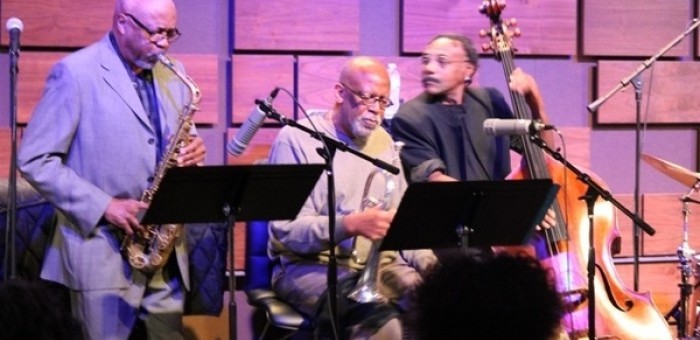Jan 13, 2026 2:09 PM
More Trump-Kennedy Center Cancellations
The fallout from the renaming of the John F. Kennedy Center for the Performing Arts to include President Donald…

Oliver Lake (left), George Sams and Darrell Mixon perform at the Ferring Jazz Bistro in St. Louis on April 21 as part of Jazz St. Louis’ “Jazz Speaks” series.
(Photo: Terry Perkins)Jazz St. Louis, the non-profit group that books world-class jazz artists at the Ferring Jazz Bistro, kicked off an exciting series titled “Jazz Speaks” at the club on April 21. The debut event featured a panel discussion and a musical and spoken-word performance featuring reedist Oliver Lake, poet Shirley LeFlore and drummer Charles “Bobo” Shaw—all founding members of the St. Louis-based Black Artists Group (BAG).
Founded in 1968, BAG served as an interdisciplinary arts organization and creative melting pot for musicians such as Lake, Shaw, reedist Hamiet Bluiett, saxophonist Julius Hemphill (1938–’95), multi-woodwind player J.D. Parran, trumpeter Floyd LeFlore and trombonist Joseph Bowie, as well poets such as Shirley LeFlore, dramatists like Malinke Robert Elliott, and numerous dancers and visual artists.
Ben Looker, assistant professor of American Studies at Saint Louis University and the author of the definitive history of the group, Point from Which Creation Begins: The Black Artists’ Group of St. Louis, served as moderator for the opening panel discussion.
In response to a question about the founding of BAG, Lake recalled a visit to Chicago to see trumpeter Lester Bowie, who had moved there from St. Louis with his wife, singer Fontella Bass, after she signed with Chess Records.
“When I took that trip to hang out with Lester, he introduced me to Muhal Richard Abrams and all the other musicians in AACM [Association for the Advancement of Creative Musicians],” Lake explained. “I saw how they had organized formally, and a light bulb went off in my head. I immediately thought, Why don’t we do this in St. Louis?
“But when I got back and brought up the idea of starting a branch of AACM here, Julius Hemphill said no,” Lake continued. “He told us that we needed to form our own group, and also include other artists like actors, dancers, painters. And that was beginning of BAG.”
Shaw discussed the empowerment he and the other BAG members found in the freedom of working without artificial barriers between art forms and within BAG’s focus on creating original music.
Interspersed in the panel comments were video clips featuring Elliott and Hemphill. Elliott’s remarks were from an upcoming documentary film about BAG, set for release in 2017.
Following the panel discussion, Lake and Shaw took the stage along with trumpeter George Sams and bassist Darrell Mixon to perform a set of original music.
Lake’s composition “Alright” began the set with his own lengthy improvisation before involving the rest of the quartet. The song was followed by “Stick,” a Hemphill composition first recorded on the World Saxophone Quartet’s 1981 album, Live In Zurich.
After Lake’s gentle ballad “Bonu,” the quartet concluded its portion of the set with the blues-drenched “Baby, Please Come Home,” originally composed by violinist and AACM member Leroy Jenkins (1932–2007).
LeFlore then joined the musicians onstage and read several selections from her collected works, Brassbones and Rainbows. She dedicated “The Musician” to Hemphill, and “Brass Reality” to her late husband, Floyd.
The band provided empathetic, solid support for LeFlore’s rhythmic, dynamic voice, especially on the funky “Singing The Hoodoo Blues.” And Shaw was appropriately in the spotlight for the concluding work, “Drum.”
The large crowd gave the performers a standing ovation, putting an exclamation point on an event that showcased the still powerful presence of BAG on the St. Louis music scene nearly five decades after its founding.
The “Jazz Speaks” BAG panel and performance certainly set a high bar for future events in the series.

Belá Fleck during an interview with Fredrika Whitfield on CNN.
Jan 13, 2026 2:09 PM
The fallout from the renaming of the John F. Kennedy Center for the Performing Arts to include President Donald…

Peplowski first came to prominence in legacy swing bands, including the final iteration of the Benny Goodman Orchestra, before beginning a solo career in the late 1980s.
Feb 3, 2026 12:10 AM
Ken Peplowski, a clarinetist and tenor saxophonist who straddled the worlds of traditional and modern jazz, died Feb. 2…

The success of Oregon’s first album, 1971’s Music Of Another Present Era, allowed Towner to establish a solo career.
Jan 19, 2026 5:02 PM
Ralph Towner, a guitarist and composer who blended multiple genres, including jazz — and throughout them all remained…

Rico’s Anti-Microbial Instrument Swab
Jan 19, 2026 2:48 PM
With this year’s NAMM Show right around the corner, we can look forward to plenty of new and innovative instruments…

Richie Beirach was particularly renowned for his approach to chromatic harmony, which he used to improvise reharmonizations of originals and standards.
Jan 27, 2026 11:19 AM
Richie Beirach, a pianist and composer who channeled a knowledge of modern classical music into his jazz practice,…